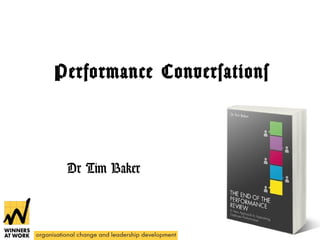
Performance Conversations
- 1. Performance Conversations Dr Tim Baker
- 2. Aims & Objectives Practice & observe some conversation structures & techniques Apply some tools & strategies for facilitating difficult performance conversations Understand how you may use a structured Five Conversations Framework with staff
- 3. Reflection • Share your experiences with the Five Conversations Framework. • What have you found easy? • What has been difficult? • What questions do you want to ask?
- 5. Job PerformanceJob Performance Individual attributes Organisational supportWork effort (Blumberg et al., 1982) Capacity to perform Willingness to perform Opportunity to perform •Demographic •Competency •Personality •Time •Budget •Tools •Instructions •Expectations •Procedures •Level of effort •Direction •Persistence
- 6. What is performance management? (Baker, 2009)
- 7. What types of systems & processes are available? Traditional approach Peer group approachDiscussion •Military •Power •Manager judgment •Relationship •Agreement •Mutual agreement •Teamwork •Multiple perceptions •Peer group judgment
- 8. What’s Wrong With the Traditional Performance Appraisal? They are a costly exercise Appraisals can be destructive Appraisals are often a monologue rather than a dialogue The formality of the appraisal stifles discussion Appraisals are too infrequent Appraisals are an exercise in form-filling Appraisals are rarely followed up Most people find appraisals stressful
- 9. Roles people play in organisations are more important than the jobs they do...
- 10. The Work People Do Job Tasks Non-job Tasks Technical skills Team role Career role Innovation & Continuous Improvement role SOURCE: The End of the Performance Review
- 15. Climate Review Conversation • On a scale of 1 to 10 (10 being high and 1 low), how would you rate your current job satisfaction? • Why did you give it this rating? • On a scale of 1 to 10 (10 being high and 1 low), how would you rate morale in the department/section/team you are working in? • Why did you give it this rating? • On a scale of 1 to 10 (10 being high and 1 low), how would you rate communication within our team and outside our team? • Why did you give it this rating? • Is there anything else you would like to comment on regarding job satisfaction, morale, or communication?
- 17. Strengths and Talents Conversation • What are the tasks you enjoy doing most in your current job? • Why do you enjoy those sorts of task? • In your current role, how can we work together to provide you with the opportunity to do more of this?
- 18. Opportunities for Growth conversation What are my expectations as manager? How are you performing to those expectations? What can we do to help you meet my expectations? Are you committed to meeting those standards in the future?
- 19. Opportunities for Growth Conversation • You’ve no doubt had a chance to review your current role. If there is one area where you believe you have an opportunity for growth, what would it be? • Can you elaborate on this so that I understand what you mean? • What can we do to improve this performance? • Apart from that, what other area in your current role do you think is an opportunity for growth? • Can I suggest that another area you might consider is ... • What’s your opinion about this? • What are the behaviors you believe you are (not) doing that are leading to this (area of improvement)?
- 20. Learning & Development conversation Technical-centred approach Person-centred approach Problem-centred approach
- 21. Learning and Development Conversation • How would you rate your technical skills on a scale of 1 to 10 (10 being high and 1 low)? • What technical areas do you think you have mastered? • What technical areas of your job could be improved? • Why do you say that? Can you give me an example? • What are some areas that you would like to develop in personally or explore further for your own growth to help you become even more effective and efficient in your work? • Why do you say that? • Can you cite an example?
- 22. Learning and Development Conversation (cont.) • What problems or dilemmas have you had to deal with over the past few months that were challenging? • What happened? • How did you approach the situation? • What did you learn from it? • How would you do things differently next time? • What knowledge, skills, or capabilities would have helped you deal with the issue you raised with me
- 24. Innovation and Continuous Improvement Conversation • Thinking about the job you do for us, what could you do … • How would you go about this? • What support would you need from me and others?
- 25. benefits of the Five Conversations Framework ongoing dialogue openness and directness flexibility timely information more relaxed approach
- 27. Big 5 Personality traits
- 28. Guidelines for Difficult Conversations around Performance • Establish & maintain rapport • Clearly explain the purpose of the conversation • Encourage the team member to talk • Listen & don’t interrupt • Avoid confrontation & argument • Focus on performance • Focus on the future • Emphasis strengths as well as weaknesses • Get down to specifics • Seek out the causes • Keep things two-way • Set & reset goals • Motivate through empathy • Terminate discussion when it is advisable • Conclude on a positive note
- 29. 20% off the price Normally $35 plus postage You get my new book for $28 plus postage!! Send me an email tim@winnersatwork.com.au by 12 midnight tonight
